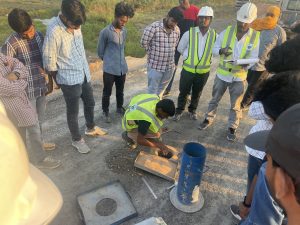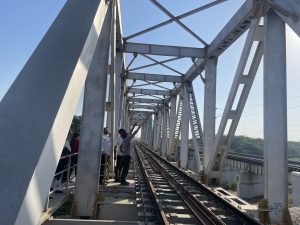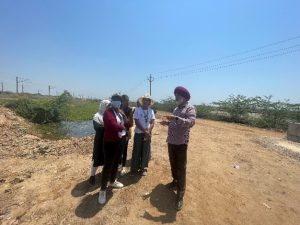Site visit to Railway Project
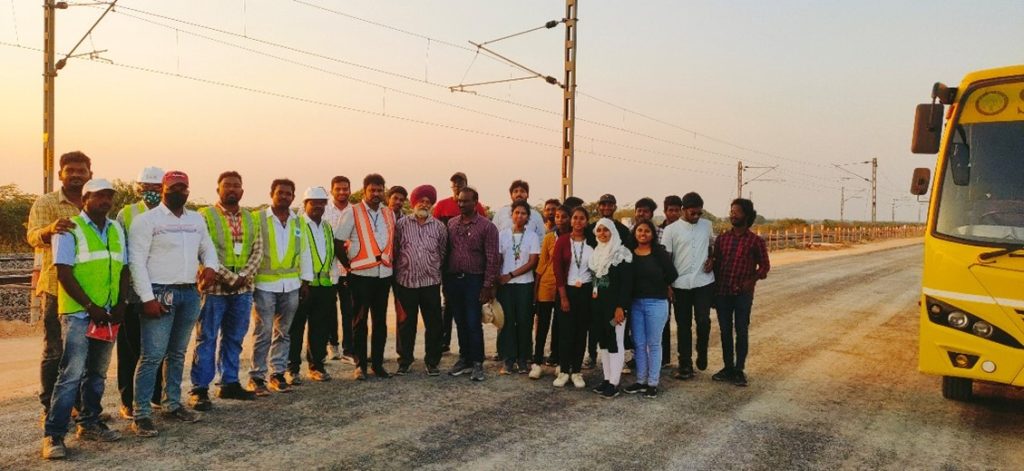
The Department of Civil Engineering has organised the third industrial visit to the ongoing railway project, “Construction works of 3rd railway line between Vijayawada and Gudur”. The tour was arranged with the support of Mr Basha, AGM, Rail Vikas Nigam Limited (RVNL) and coordinated by Mr Lakwanth Singh Khalsa, Project Manager, Systra, India. The field visit was guided by engineers from Systra and GR Infra (GRIL) working on respective sites and coordinated by the faculty.
Visit Highlights:
- Construction activities of Railway Under Bridge (RUB) at LC225: Understanding the difficulties due to black cotton soil and water seepage, diversion works of existing natural streams of irrigation channels, dewatering and pumping arrangements, alignment challenges, and girder design challenges.
- Erection of Foot Over Bridge (FOB) at Chirala Railway Station
- GRIL Laboratory Camp: Batching plant, Ready Mix Concrete, Quality Control tests, Concrete Permeability Test, etc.
- Steel Bridge at BR. NO. 612: Procedure of fabrication, inspection, and erection of girders, components of the girder, etc.
- Railway Formation: Earthwork, Blanket, Tests to be conducted at the site, and Method of laying.
Coordinating faculty: Dr A Uma Maheswar
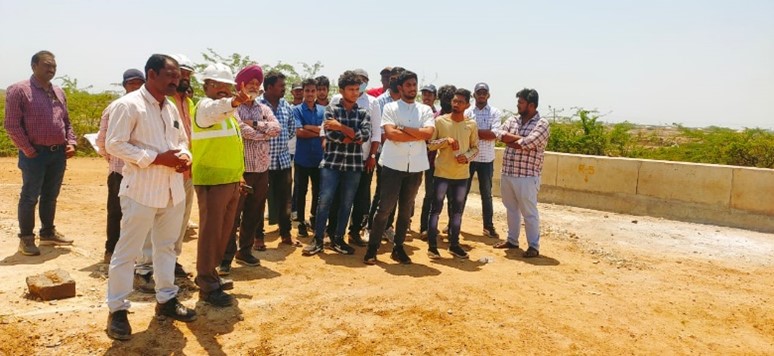
- Published in CIVIL NEWS, Departmental News, News
SERB- SURE Grants: 10 projects worth 2.50 crores awarded to SRM AP
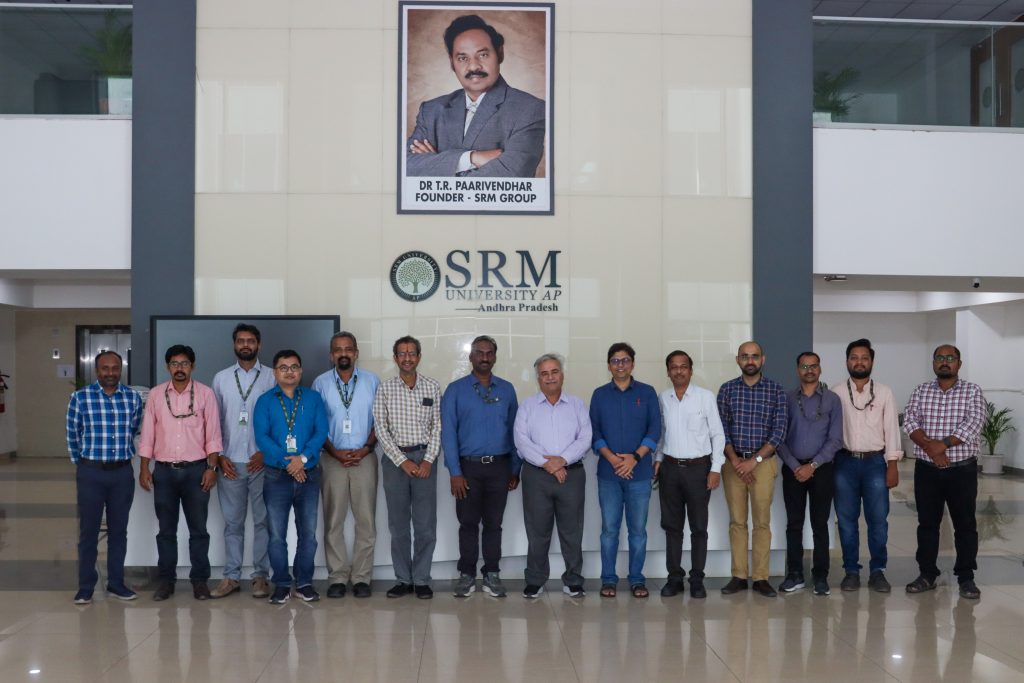
The faculty of SRM University-AP have been awarded 10 projects worth 2.50 crores from the Science and Engineering Research Board (SERB-SURE). Department of Science and Technology (DST) received a total of 2000 proposals, of which 466 were sanctioned. Among the 466 projects, 151 projects were awarded to Private Universities. Of the 151 projects approved to state private universities and colleges throughout India, the five-and-a-half-year young varsity was awarded 10 projects. 10 professors from various Science and Engineering Departments brought this incredible achievement to the university.
SERB-SURE is a research grant scheme initiated by the Science and Engineering Research Board (SERB) in India to provide financial support to young researchers in the early stages of their careers. The grants are intended to support research in basic and applied sciences, engineering, and technology and is typically granted for a period of three years.The SERB-SURE scheme is one of several initiatives by SERB to promote scientific research in India and support the development of a strong research community in the country.
“It is a milestone achievement that resonates with the University’s unparalleled commitment for excellence. We are striving towards research-intensive learning to build cutting-edge innovation for a transformative tomorrow”, commented Vice Chancellor, Prof. Manoj K Arora. The Executive Director-Research of SRM Group, Prof. Narayana Rao said that, “SRM University-AP has travailed hard to achieve the world-class scientific temperament that we now advocate, and this achievement is a testimonial recognition of all our efforts.” The prestigious grants were sanctioned to the faculty in the on-going domains of Quantum Kinetic Approach, Antimicrobial Resistance (AMR) Profiling and Changing of Hydroclimatic conditions in Bay of Bengal among 7 others.
Dean-SEAS, Prof. Ranjith Thapa said, “These research could be path-breaking and could offer a solution to many of the societal difficulties.” Prof. Jayaseelan Murugaiyan, Dr Sandeep Singh and Dr Pitchaiah Cherukuri of the Department of Biological Sciences; Dr Sabyasachi Chakrabortty, Dr V S Baswanth Oruganti of the Department of Chemistry; Dr Debabrata Pramanik, Dr Ravi Kumar and Dr Pankaj Bhalla of the Department of Physics ; Dr Sandeep Kumar Verma of the Department of Mathematics; Dr Uma Maheswar Arepalli of the Department of Civil Engineering; and Dr Kousik Das of the Department of Environmental Science and Engineering were awarded the grants.
- Published in Biology News, Chemistry-news, CIVIL NEWS, Departmental News, ENVS News, Math News, News, Physics News, Research News
Best Paper Award: Conferred to Dr Raviteja KVNS at RAISE 2023
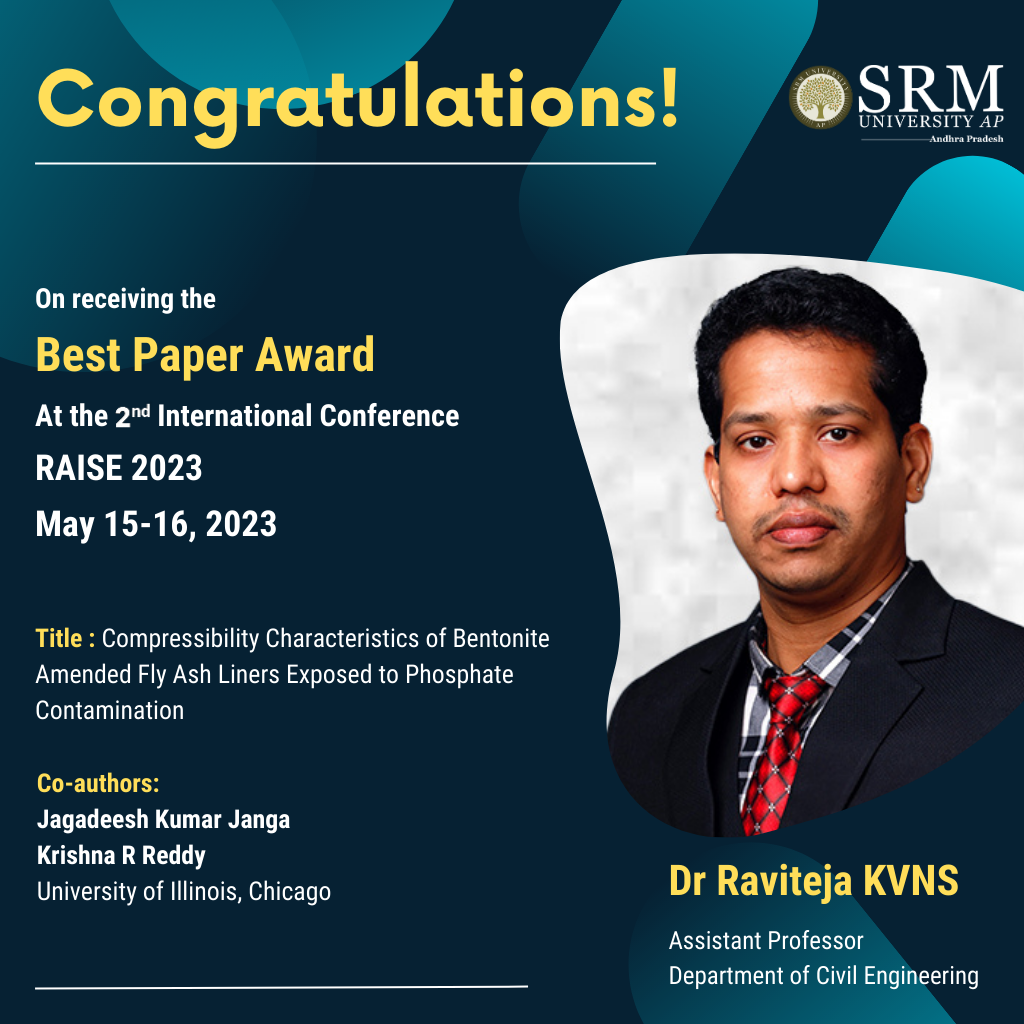
The Department of Civil Engineering is glad to announce that Dr Raviteja KVNS, Assistant Professor, has received the Best Paper Award for his paper titled “Compressibility Characteristics of Bentonite Amended Fly Ash Liners Exposed to Phosphate Contamination” at the 2nd International Conference RAISE 2023 (Recent Advances in Sustainable Environment) held on May 15-16, 2023. Dr Raviteja collaborated with Dr Janga Jagadeesh Kumar and Dr Krishna R Reddy, Civil, Materials and Environmental Engineering, University of Illinois Chicago for the research paper. Their cutting-edge research focused on developing alternate liner materials for waste containment systems.
Abstract
Waste containment systems like landfills, and impoundments are often lined with low permeable clays of hydraulic conductivity less than 10-7 cm/s. However, it is often challenging to get large volumes of low permeable clays near the project site. Conveyance of large volumes of clay from distant locations can be unsustainable due to the associated carbon emissions and energy costs, and not viable financially. Hence, there is a need to identify alternative liner materials without compromising on the containment capabilities. This study proposes the use of fly ash, amended with bentonite, as an alternative to the traditional liner systems. From preliminary studies, it is understood that a mixture of 80% fly ash amended with 20% bentonite is optimal to function as an effective liner material. However, the hydro-mechanical stability of liners needs to be investigated under different contamination scenarios. The present study reports the compressibility behavior of the proposed liner system under phosphate contamination, typically found in landfill leachate, impoundments, and stormwater retention ponds. One-dimensional consolidation tests were conducted on pure bentonite and fly ash with water to study the compressibility characteristics of individual materials. The optimum mix (80-20) was then tested at three different solutions exposure: water, 3.2 mg/L PO4-3-P and 12 mg/L PO4-3-P. It is depicted that the addition of 20% bentonite to fly ash did not affect the compressibility significantly, while the presence of phosphate contamination did not compromise the hydro-mechanical stability of the proposed liner system.
- Published in CIVIL NEWS, Departmental News, Faculty Achievements, News, Research News


